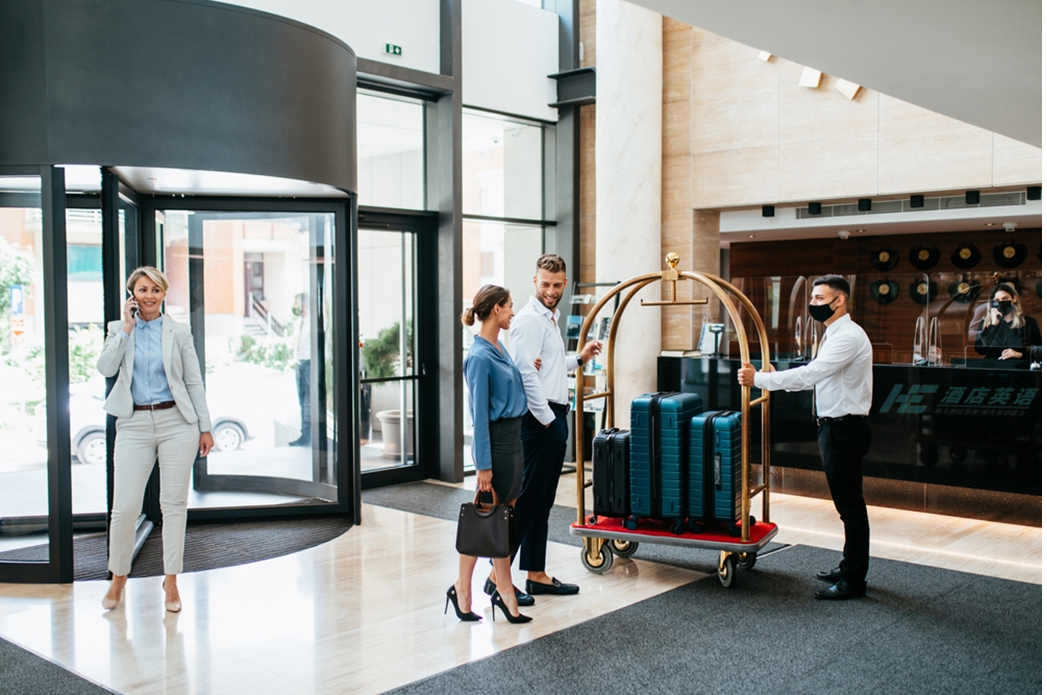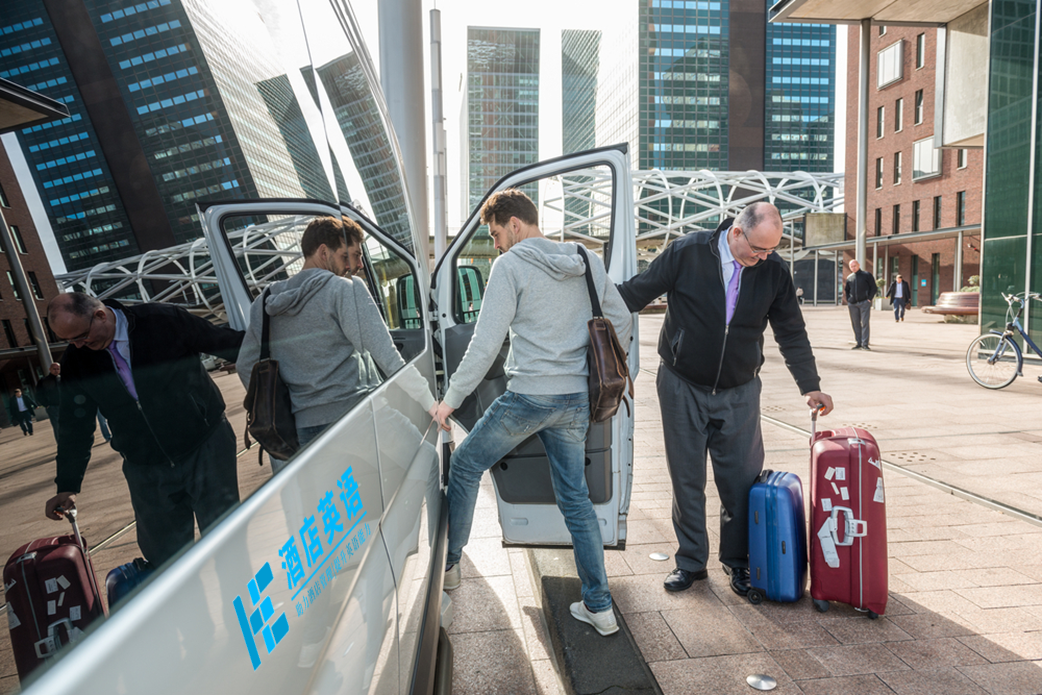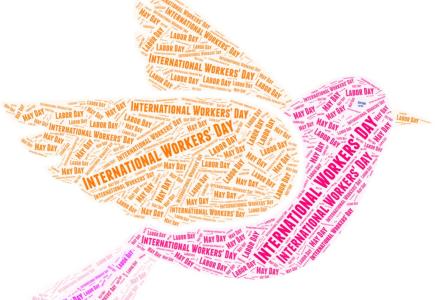接机服务工作流程
一、准备工作
- 根据客人的预订信息,提前一天确认客人的到达时间、航班号、人数、行李数量等信息。
- 根据客人的需求,安排合适的车辆和司机,以及礼宾部员工的着装和仪容仪表。
- 准备好接机牌,上面写明酒店的名称和logo,以及客人的姓名或代号。
- 准备好酒店的介绍资料、地图、活动指南等,以便在车上向客人提供相关信息。
- 与前台部门保持联系,了解客人的房间情况,以便及时安排入住。
二、接机过程
- 提前至少半小时到达机场,根据航班信息查询客人的到达航站楼和出口,并在出口处等候。
- 见到客人后,微笑致意,举起接机牌,并主动上前与客人打招呼,介绍自己的姓名和职务,询问客人的姓名和称呼。
- 帮助客人搬运行李,并引导客人前往停车场,途中向客人介绍酒店的位置、距离、交通情况等。
- 在车上,为客人提供瓶装水、纸巾、杂志等,并根据客人的兴趣和需求,向客人介绍酒店的设施、服务、特色等,以及周边的景点、活动、美食等。
- 在抵达酒店前,与前台部门联系,确认客人的房间号码,并告知客人。
- 在酒店门口,协助客人下车,并将行李交给门童,然后引导客人进入大堂,并向大堂经理或前台员工介绍客人。
- 如果客人已经办理了快速入住或在线入住,则直接带领客人前往电梯,并告知客人房间所在的楼层和方向。
- 如果客人还没有办理入住,则陪同客人到前台柜台,并协助客人完成入住手续,同时向前台员工说明客人的特殊要求或偏好(如果有)。
- 在送客人到房间之前,与房务部门联系,确认房间是否已经准备好,并请求房务员在房间内等候。
- 在电梯内或走廊上,向客人介绍酒店的其他设施和服务,如餐厅、健身房、游泳池、商务中心、会议室等,并告知客人如何使用房卡和电梯。
- 在房间门口,敲门并报上自己和客人的姓名,并请房务员开门。
- 进入房间后,将行李放置在合适的位置,并请房务员向客人介绍房间的各项设施和功能,如空调、电视、迷你吧、保险箱、电话等,并告知客人如何使用它们。
- 在房务员离开后,再次向客人确认他们对房间是否满意,并询问他们是否需要其他任何帮助或服务。
- 如果客人有任何问题或要求,则尽力解答或满足,如果无法立即解决,则承诺尽快处理,并告知客人处理的时间和方式。
- 如果客人没有其他问题或要求,则向客人表示感谢和欢迎,并告知客人如何联系自己或礼宾部,以及酒店的紧急电话号码。
- 在离开房间之前,再次向客人致意,并祝他们在酒店度过愉快的时光。
Part 1. 基础词汇
| 英文词汇 | 音标 | 中文意思 |
|---|---|---|
| airline | /ˈeəlaɪn/ | 航空公司 |
| airport | /ˈeəpɔːt/ | 机场 |
| arrival | /əˈraɪvəl/ | 到达 |
| baggage | /ˈbæɡɪdʒ/ | 行李 |
| boarding pass | /ˈbɔːdɪŋ pɑːs/ | 登机牌 |
| business class | /ˈbɪznəs klɑːs/ | 商务舱 |
| cabin | /ˈkæbɪn/ | 机舱 |
| captain | /ˈkæptɪn/ | 机长 |
| check in | /tʃek ɪn/ | 办理登机手续 |
| concierge | /kɒnˈsjɛəʒ/ | 礼宾部员工 |
| customs | /ˈkʌstəmz/ | 海关 |
| delay | /dɪˈleɪ/ | 延误 |
| departure | /dɪˈpɑːtʃə/ | 出发 |
| e-ticket | /iː ˈtɪkɪt/ | 电子票 |
| emergency exit | /ɪˈmɜːdʒənsi ˈeksɪt/ | 紧急出口 |
| flight attendant | /flaɪt əˈtendənt/ | 空乘人员 |
| gate | /geɪt/ | 登机口 |
| luggage claim | /ˈlʌgɪdʒ kleɪm/ | 行李提取处 |
| passport | /ˈpɑːspɔːt/ | 护照 |
| visa | /ˈviːzə/ | 签证 |
Part 2. 关键句型
一、问候客人
- Welcome to (city/country). My name is (name) and I am from (hotel name) concierge service. 欢迎来到(城市/国家)。我叫(姓名),来自(酒店名称)的礼宾部服务。
- 这是一个礼貌而专业的开场白,用于向客人介绍自己和所属的酒店。注意使用客人到达的城市或国家来表示欢迎,而不是使用自己所在的城市或国家,因为客人可能是从其他地方转机而来。
- 注意使用礼宾部服务而不是接机服务,因为礼宾部服务包含了接机服务以及其他更多的服务项目,可以给客人留下更好的印象。
- How was your flight? 您的飞行情况如何?
- 这是一个常见而友好的提问,用于与客人建立联系和信任,也可以了解客人是否有任何不适或疲劳的情况,以便提供相应的帮助或建议。
- 注意使用过去时态,因为飞行已经结束,而不是使用现在时态或进行时态,因为那会让客人感觉还在飞行中。
- Do you need any assistance with your luggage? 您需要我帮您搬运行李吗?
- 这是一个礼貌而周到的提问,用于向客人表示自己愿意为他们提供行李搬运的服务,也可以避免客人感觉被强迫或冒犯。
- 注意使用any而不是some,因为any表示对数量或种类没有限制,而some表示有一定的限制或选择。使用any可以让客人感觉更自由和舒适。
二、引导客人
- Please follow me to the parking lot. The car is waiting for us. 请跟我来到停车场。车子已经在等我们了。
- 这是一个简单而清晰的指示,用于告诉客人下一步要做什么,并给他们一种安全和可靠的感觉。
- 注意使用please来表示礼貌和尊重,而不是使用let’s或come on等较随意或强硬的表达方式,因为那会让客人感觉被命令或催促。
- The hotel is about (distance) from the airport. It will take us about (time) to get there, depending on the traffic. 酒店距离机场大约(距离)。根据交通情况,我们大约需要(时间)才能到达那里。
- 这是一个常见而有用的信息,用于向客人介绍酒店的位置和距离,并给他们一个大致的时间预期,以便他们安排自己的计划或休息。
- 注意使用depending on the traffic来表示时间可能会有变化,而不是使用if或unless等表示条件或假设的词语,因为那会让客人感觉不确定或担心。
- On the way, I will introduce you to some of the hotel’s facilities and services, as well as some of the attractions and activities around the hotel. If you have any questions, please feel free to ask me. 在路上,我会向您介绍一些酒店的设施和服务,以及酒店周边的一些景点和活动。如果您有任何问题,请随时问我。
- 这是一个友好而专业的建议,用于向客人表示自己愿意为他们提供更多的信息和帮助,并鼓励他们与自己进行交流和互动。
- 注意使用will而不是can或may,因为will表示一种承诺或保证,而can或may表示一种可能或许可。使用will可以让客人感觉更信任和满意。
三、送达客人
- We have arrived at the hotel. Please wait in the car and I will get the door for you. 我们已经到达酒店了。请您在车上稍等,我会为您开门。
- 这是一个礼貌而周到的通知,用于告诉客人已经到达目的地,并为他们提供开门的服务,以便他们下车时更方便和舒适。
- 注意使用please wait而不是just wait或don’t move等较粗鲁或强硬的表达方式,因为那会让客人感觉被命令或不耐烦。
- Let me introduce you to the lobby manager/front desk staff. They will help you with the check-in process. 让我向您介绍一下大堂经理/前台员工。他们会帮助您办理入住手续。
- 这是一个礼貌而专业的介绍,用于向客人介绍酒店的其他工作人员,并为他们提供入住的服务,以便他们更快和更顺利地完成入住。
- 注意使用let me而不是I will或I can等较自我或不确定的表达方式,因为let me表示一种请求或建议,而I will或I can表示一种意愿或能力。使用let me可以让客人感觉更尊重和接受。
- This is your room. I hope you like it. If you need anything, please dial (number) to reach the concierge service. 这是您的房间。希望您喜欢。如果您需要任何东西,请拨打(号码)联系礼宾部服务。
- 这是一个友好而周到的告别,用于向客人展示他们的房间,并为他们提供联系方式,以便他们在需要时可以得到帮助或服务。
- 注意使用hope而不是wish或think等较主观或不确定的表达方式,因为hope表示一种期望或祝福,而wish或think表示一种愿望或看法。使用hope可以让客人感觉更温馨和感激。
Part 3. 情景对话
- C: Concierge staff
- G: Guest
C: Welcome to Hainan, Mr. Smith. My name is Li and I am from the Miros Sanya Resort and Spa concierge service. I am here to pick you up and take you to the hotel. (Holds up a sign with the guest’s name and the hotel logo)
G: Thank you, Li. It’s very nice to meet you.
C: How was your flight? I hope you had a smooth journey.
G: It was fine, thank you. A bit long, but not too bad.
C: I’m glad to hear that. Do you need any assistance with your luggage?
G: Yes, please. I have two suitcases and a backpack.
C: No problem. Let me help you with that. (Helps the guest carry his luggage to a trolley) Please follow me to the parking lot. The car is waiting for us.
G: OK, thank you.
C: The hotel is about 40 kilometers from the airport. It will take us about an hour to get there, depending on the traffic.
G: I see. Is it far from the beach?
C: No, not at all. The hotel is located on Yalong Bay, which is one of the most beautiful beaches in Hainan. You can enjoy the stunning views of the sea and the mountains from your room.
G: That sounds wonderful.
C: On the way, I will introduce you to some of the hotel’s facilities and services, as well as some of the attractions and activities around the hotel. If you have any questions, please feel free to ask me.
G: Sure, thank you.
C: So, Mr. Smith, where are you from?
G: I’m from London, England.
C: Oh, London. I’ve always wanted to visit London. What do you do there?
G: I’m a journalist. I work for a travel magazine.
C: Really? That’s very interesting. So you travel a lot for your work?
G: Yes, I do. I’ve been to many places around the world, but this is my first time in Hainan.
C: Well, I hope you enjoy your stay here. Hainan is a very beautiful and diverse island. There are many things to see and do here.
G: What do you recommend?
C: Well, besides relaxing on the beach or swimming in the pool, you can also try some water sports, such as surfing, sailing, or diving. There are also some cultural and historical sites, such as temples, museums, and villages. And of course, you can’t miss the local cuisine, which is very delicious and spicy.
G: That sounds great. How long are you staying in Hainan?
C: I’m staying for a week.
C: That’s a good amount of time. You can explore different parts of the island and experience different aspects of its culture and nature.
G: Yes, that’s what I plan to do.
C: We have arrived at the hotel. Please wait in the car and I will get the door for you. (Gets out of the car and opens the door for the guest)
G: Thank you.
C: Let me help you with your luggage again. (Takes the luggage from the trolley and puts it in another car) This car will take your luggage to your room directly. You don’t need to worry about it.
G: OK, thank you very much.
C: Please follow me to the lobby. They will help you with the check-in process.
C: 欢迎来到海南,史密斯先生。我叫李,来自三亚米罗度假酒店的礼宾部服务。我来接您去酒店。(举着一个写有客人姓名和酒店logo的牌子)
G: 谢谢你,李。很高兴认识你。
C: 您的飞行情况如何?希望您有一段顺利的旅程。
G: 还不错,谢谢你。有点长,但还可以。
C: 很高兴听到这个。您需要我帮您搬运行李吗?
G: 是的,请。我有两个行李箱和一个背包。
C: 没问题。让我帮您拿一下。(帮客人把行李放到一个手推车上)请跟我来到停车场。车子已经在等我们了。
G: 好的,谢谢你。
C: 酒店距离机场大约40公里。根据交通情况,我们大约需要一个小时才能到达那里。
G: 我明白了。离海滩远吗?
C: 不,一点也不。酒店位于亚龙湾,这是海南最美丽的海滩之一。您可以从您的房间欣赏到海洋和山脉的壮丽景色。
G: 那听起来很棒。
C: 在路上,我会向您介绍一些酒店的设施和服务,以及酒店周边的一些景点和活动。如果您有任何问题,请随时问我。
G: 好的,谢谢你。
C: 那么,史密斯先生,您来自哪里?
G: 我来自英国伦敦。
C: 哦,伦敦。我一直想去伦敦看看。你在那里做什么?
G: 我是一名记者。我为一本旅游杂志工作。
C: 真的吗?那很有趣。那你为了工作经常旅行吗?
G: 是的,我经常旅行。我去过世界上很多地方,但这是我第一次来海南。
C: 好吧,希望您喜欢这里。海南是一个非常美丽和多样化的岛屿。这里有很多值得看和做的事情。
G: 你有什么推荐吗?
C: 嗯,除了在沙滩上放松或在游泳池里游泳外,您还可以尝试一些水上运动,比如冲浪、帆船或潜水。还有一些文化和历史景点,比如寺庙、博物馆和村庄。当然,您也不能错过当地的美食,非常美味和辣。
G: 那听起来很棒。你在海南玩多久?
C: 我玩一个星期。
G: 那是一个很好的时间。你可以探索岛上的不同地方,体验它的不同文化和自然。
C: 是的,这就是我的计划。
C: 我们已经到达酒店了。请您在车上稍等,我会为您开门。(下车并为客人开门)
G: 谢谢你。
C: 让我再帮您拿一下行李。(从手推车上取下行李,放到另一辆车上)这辆车会直接把您的行李送到您的房间。您不用担心它。
G: 好的,非常感谢你。
C: 请跟我来到大堂。他们会帮助您办理入住手续。

Part 4. 课堂练习
-
Which of the following is a polite and professional way to introduce yourself to the guest at the airport?
- A) Hi, I’m from the hotel. Come with me.
- B) Hello, this is (name) from (hotel name) concierge service. I am here to pick you up and take you to the hotel.
- C) Hey, what’s up? I work for the hotel. Let’s go.
- D) Greetings, my name is (name) and I work at (hotel name). You are lucky to have me as your driver.
- Answer: B
- Explanation: B is the correct answer because it uses a friendly and respectful tone, introduces your name and your hotel, and explains your purpose. A is too brief and informal, C is too casual and slangy, and D is too arrogant and rude.
-
Which of the following is a common and friendly question to ask the guest about their flight?
- A) How was your flight?
- B) How much did you pay for your flight?
- C) How many times did you fly before?
- D) How do you feel about flying?
- Answer: A
- Explanation: A is the correct answer because it is a simple and polite way to inquire about the guest’s flight experience and show your concern. B is too personal and inappropriate, C is too irrelevant and boring, and D is too vague and subjective.
-
Which of the following is a useful and clear instruction to tell the guest where to go after getting their luggage?
- A) Please follow me to the parking lot. The car is waiting for us.
- B) Just wait here. I’ll get the car for you.
- C) Come on, let’s go. The car is over there.
- D) Don’t move. I’ll be right back with the car.
- Answer: A
- Explanation: A is the correct answer because it uses please to show politeness and respect, follow me to show direction and guidance, and the car is waiting for us to show security and reliability. B is too informal and dismissive, C is too casual and impatient, and D is too rude and commanding.
-
Which of the following is a common and useful information to tell the guest about the hotel’s location and distance from the airport?
- A) The hotel is about (distance) from the airport. It will take us about (time) to get there, depending on the traffic.
- B) The hotel is very far from the airport. We have to drive for a long time, if there is no traffic jam.
- C) The hotel is very close to the airport. We will be there in no time, unless there is an accident.
- D) The hotel is somewhere between the airport and the city. I don’t know how long it will take us to get there, because I don’t know the traffic situation.
- Answer: A
- Explanation: A is the correct answer because it gives a specific and accurate information about the hotel’s location and distance, and gives a reasonable and flexible time estimate based on the traffic condition. B is too vague and negative, C is too optimistic and risky, and D is too uncertain and unprofessional.
-
Which of the following is a friendly and professional way to say goodbye to the guest after showing them their room?
- A) This is your room. I hope you like it. If you need anything, please dial (number) to reach the concierge service.
- B) This is your room. It’s not bad, right? If you want something, just call me at (number).
- C) This is your room. It’s very nice, isn’t it? If you have any problems, you can call (number) for help.
- D) This is your room. It’s OK, I guess. If you don’t like anything, you can complain at (number).
- Answer: A

 酒店英语
酒店英语






